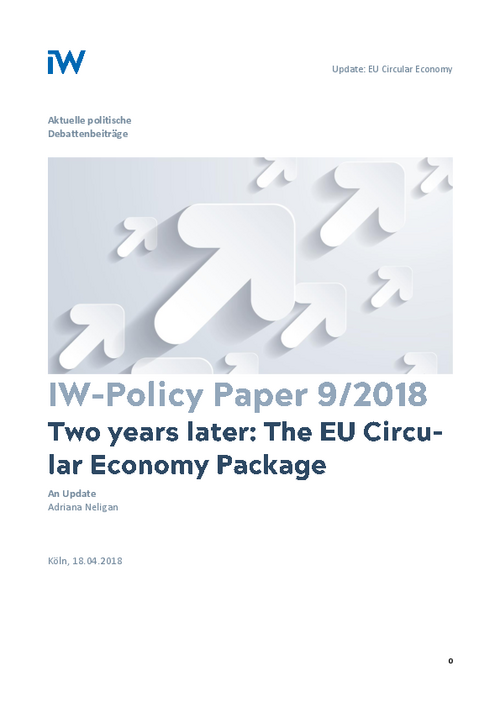The European Commission aims to push forward the concepts of ‘recycle, repair and re-use’ as well as waste avoidance. Two years after adopting the Circular Economy Package, EU institutions finally agreed on new EU waste rules.

Two years later: The EU Circular Economy Package
IW-Policy Paper

The European Commission aims to push forward the concepts of ‘recycle, repair and re-use’ as well as waste avoidance. Two years after adopting the Circular Economy Package, EU institutions finally agreed on new EU waste rules.
Despite lower recycling targets as originally envisaged, most countries still have to push recycling to meet the goals. A single method of determining recycling rates was also decided, but an exemption rule will continue to allow for disparate recycling rates.
Only ten countries including Germany are on track with their currently reported recycling rates to achieve the first goal of 55 per cent by 2025, assuming they keep up their recycling efforts of the past decade. Germany is leading the recycling hierarchy with 66 per cent, much more than on EU average. However, according to the new calculation method, Germany’s recycling rate would drop to between 47 and 52 per cent. In this case, the German recycling rate would have to rise between 0.7 and 0.9 percentage points annually until 2035 to achieve 65 per cent. Looking back, Germany only managed 0.5 percentage points annually over the past decade based on the current method. Hence, Germany would have to push recycling and focus on more high-quality recycling. Fortunately, the country is a role model not only for its long recycling tradition and modern waste management, but also for its global leadership in recycling technologies.
To comply with the Package many EU countries will need a completely new waste treatment system, and many companies will need to re-think some established business models. For businesses, the transition to a circular economy will likely include costs and risks, but can also lead to new business opportunities for German companies making and exporting circular economy-relevant products and services.
The recent decision on EU-wide targets is an important step forward to ensure planning and investment security. Otherwise it is difficult for businesses to initiate further necessary investments in recycling technologies and capabilities. In addition, minimal bureaucracy, good access to finance, capacity building and specific expertise are key to not impede relevant activities to a circular economy. There is still untapped potential for more eco-innovations and for the use of digital solutions to speed up the transition towards a circular economy.

Adriana Neligan: Two years later – The EU Circular Economy Package
IW-Policy Paper


Inflation in der Eurozone: Der Weg bleibt holprig
Die Inflation in der Eurozone befindet sich auf dem Rückzug. Ein Aufatmen wäre aber verfrüht. Zweitrundeneffekte im Arbeitsmarkt sind im vollen Gange und setzen die Geldpolitik weiter unter Druck.
IW
Trump oder Harris oder …? Worauf sich Europa einstellen muss
Wenige Monate vor der Präsidentschaftswahl in den USA hat Donald Trump gute Chancen auf eine Wiederwahl. Auf Seiten der Demokraten hat der amtierende Präsident seine Kandidatur nach langem Zögern zurückgezogen, Vizepräsidentin Kamala Harris wird mit hoher ...
IW